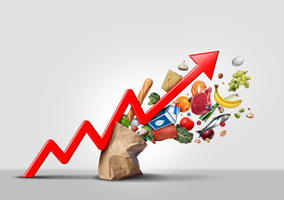I remember clearly the day when the credit crunch first hit the headlines, back when once-in-a-lifetime macroeconomic events seemed to happen, well, once-in-a-lifetime. I was working as a newly-promoted audit assistant manager, fortunate enough to be sitting in a client’s Sydney office next to our technical partner, who provided an excellent if sobering summary of exactly what was going on.
This means that for almost my entire career as a manager, and certainly as a senior manager, I have worked in an environment dominated by low inflation, low interest and high predictability. Forecasts in my current role have been remarkably accurate (aside from the usual one or two known unknowns), which has been less due to a genius for foresight, rather thanks to reliability in costs and income.
The credit crunch was 14 years ago, so it’s fair to say that a significant percentage of senior management will have worked either exclusively or predominantly in this same “predictable” environment. Experience of times of higher inflation, certainly at the rate we’re seeing now, is limited in the extreme, born from a different environment and context. Inflation’s direct cumulative impact is by nature difficult to foresee and that’s before considering its indirect influence on income and behaviours as well as costs, creating much more complex scenarios to forecast for.
I’ve heard interesting discussions around what high inflation means for forecasting: does it mean that costs and forecasts need more detail to get a clearer idea of the likely impact, or in broader terms to get a general feel of context in a sea of unknowns? I’ve heard convincing arguments for both. As ever, you may need to do both. It makes sense to look more closely at electricity costs, for example, which are having a material impact, but in some other areas a broader view may be just as productive (and accurate).
However, listening to these discussions was a useful exercise and brought to mind one of the few positives to come out of the pandemic: people are keen to talk more with more people.
From the relationships I built during that time, if I have a question, I can ask it to a wider audience and receive more diverse perspectives and opinions. These discussions have been invaluable, even if they don’t provide the answer to a specific question (if anyone knows the “right” answer to pay reviews in the current environment please let me know!). My understanding has broadened (I think!), giving greater clarity around the context of specific decisions as well as the later ones, which they may lead to.
Benchmarks
These discussions remind me of the charity sector’s ongoing quest for benchmarks and measures of efficiencies, something very challenging in a diverse and increasingly dynamic sector. While there undoubtedly are benefits from benchmarking, should our focus be driven so much by just numbers for comparable organisations, or could benchmarking also be an opportunity to trigger conversations with people outside our normal sphere? Could a benchmarking tool incorporate narrative elements, brief summations of objectives, culture, priorities and risks? These elements can’t often be summed up briefly but trying to do so can initiate discussions and explanations. Could such a tool require each charity to not just input, but commit to reviewing verbally with other charities a brief comparison of a few key figures from the data as well as the narrative comments? An hour-long high-level chat with “new” people as part of the benchmarking process is unlikely to offer perfect solutions but could start discussions and relationships which may assist with so many other issues over a longer period.
One of the greatest advantages of the charity sector is being able to combine such a wide array of diverse minds and assist each other, whereas the private sector is naturally dominated by competition. Yet this is something which we don’t do enough and is often focused on discussions at senior levels with people we are more comfortable talking to. I feel the opportunity is only half being taken at best, particularly while we remain so focused on numbers within benchmarking but not embracing the discussions they should trigger.
So, how do we “manage” inflation and mitigate the risks it brings? The importance of being a dynamic organisation in the digital age grows as does the importance, quality and use of real-time data, which was already essential before high inflation, the pandemic and even back to the credit crunch. Additionally retaining the human side and learning from others and the evidence they have gathered is crucial if we are to use our data well.
I still recall that chat with our technical partner which I took so much from, listening to someone who thought about things in a way I didn’t and still don’t. I believe there’s an awful lot of those conversations out there which are more important than ever, particularly in a world of hybrid working which makes these discussions crucial and also easier to arrange.
David Hawes is finance director of Devon Air Ambulance Trust










